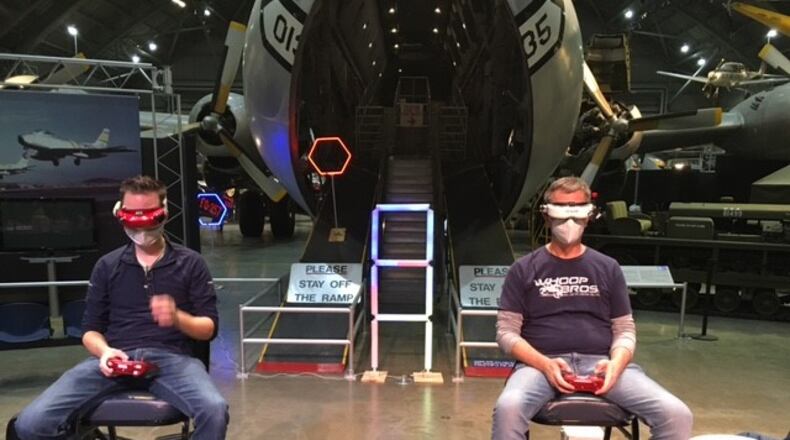Registered micro drone pilots will race in a series of two-minute heats with four drones in each heat from 11 a.m. to 5 p.m. at the museum.
Spectators can watch in the museum’s second building, as well as from a large screen offering the pilots’ first-person view.
Kele Stanley, a senior UAS pilot with Columbus’ Asymmetric Technologies, LLC and an organizer of Saturday’s event, knows the joys and perils of flying the small drones (which he calls “Tiny Whoops”).
Crashes are “inevitable,” he said in an interview at the museum Friday. Drones are jostling through small gates and in confined spaces. Life, somehow, goes on.
“The beauty of it is, the less you crash, the more likely you are to win the race,” he said.
And the more likely you might be to, possibly, find a career. Stanley calls himself “another drone guy,” but he knows of teens who are racing professionally and he himself works for a company that inspects public infrastructure for the state of Ohio with drones. Drones are everywhere these days.
“It’s really something that can turn a certain youth’s life into potentially a career, just racing toys,” Stanley said. “And for us, it’s just fun here.”
Drone racing may grow to a $500 million market in five years, according to a Spring marketing study by Transparency Marketing Research. The Drone Racing League says its events are watched by “millions of fans” on NBC, NBCSN, Twitter and Facebook.
The view visitors can expect Saturday at the museum will be almost as if “you are flying within the drone,” Stanley said.
For much of the day, from 9 a.m. to 4 p.m., museum visitors will also be able to experience flying a drone with computer-based simulators from the Air Force Research Lab (AFRL), the Sinclair College Unmanned Aerial Systems program, the museum’s Education Division and the Drone Racing League, a global, professional drone racing circuit for professional pilots racing up to 90 mph.
Visitors can then fly an actual drone in designated areas courtesy of AFRL and the museum’s Education Division.
However, base personnel emphasize that it’s best to leave your personal drone at home. The prohibition against flying drones at or around the museum has not been relaxed.
“Leave your drones at home,” Stanley advised.
The Air Force Museum features more than 350 aerospace vehicles, missiles and thousands of artifacts on more than 19 acres of indoor exhibit space, drawing more than 800,000 visitors from around the world yearly.
About the Author


